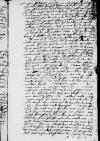Ew(e)r H(erlichkei)t ⌊⌋ hab wir durch dissen boten gestriges tages um(m)b die vesperzceit entfang(en), / und ists uns herczlich lieb gewest, / das ir mit ew(e)r togentszamen ⌊hausfruen⌋ und unserm(m) geliebten freunde, dem h(e)rn ⌊danczker castellan⌋, gesunt gen ⌊Preuschenmarckt⌋ seit gekomen(n). / Ist aber unnoth gewest uns zu dancken, / so wir das paper damaged⌈[as]as paper damaged⌉ selbige euch schuldig, / das ir uns hie unbesvert paper damaged⌈[rt]rt paper damaged⌉ bosucht habt. / Hette wir ouch gewust, das die tauffe so lange het sold ansthen, / wer E(wer) H(erlichkei)t in keinen(n) weg so balde eilents von uns gekomen(n) etc.
Das E(wer) H(erlichkei)t mit ⌊f(ursticher) d(urchlauch)t⌋ zusamne sol komen(n), ... illegible⌈...... illegible⌉ hab wir gern vornomen(n), / der zuvorsicht, werdet mit seiner d(urchlauch)t alle das iennige, das hie zcwischen uns geredt und bewogen, anczegen, / do bey ouch unser svester, der ⌊Reynegschen(n)⌋, nicht vorgessen(n). / Wir wollen ouch im korczen durch unsern bruder ⌊Iorgen⌋ sein ⌊d(urchlauch)t⌋ besuchen, / schrifftlich und mun(n)tlich, ouch seiner d(urchlauch)t nichts vorhalten(n) / etc. An den(n) h(e)rn ⌊Corneliu(m)⌋ wolle wir ouch mit den erstn(n) schreiben / und E(wer) H(erlichkei)t zuschicken. /
Was belangt, das der gutte her(r) etc. in collacien redt, / hoth er doch das vil noch der gestalt zum ⌊Elbing⌋ im rothe solchs von sich lossen horen(n). / Hiraus ist nichts guts zu nemen oder hoffen. / Wirt ⌊ko(niglich)e m(ajeste)t⌋ nicht darczu thun / und solchen leuten iren mutwillen korczen, / wirt vil weger sein hernoch mols geswigen. / Wir sein der meynung, noch wenig tagen der und ander sachen wegen(n) an ⌊ko(niglich)e m(ajeste)t⌋ und den ⌊h(e)rn von Ploczko⌋ durch eigenen boten zuschreiben(n). / Wollen nichts nochlossen, was hirinne E(wer) H(erlichkei)t und uns allen zu gut und von noten ist, / dobey ouch des redesschen handels nicht vorgessen. /
Unser kanczler ist nicht widerkomen(n). / Wir lossen uns beduncken, werd uff unser ⌊libn(n) frawen⌋ tag[1] negst kunfftig zu ⌊Lublin⌋ sein. / Wan er an(n) uns oder seine schriffte gelangen, / wolle wir E(wer) H(erlichkei)t nicht bergen, was uns newes von im wirt zukomen(n). / Hie mit Gothe dem almechtig(en) in sein gnad befholen. / Bitten ew(e)r togentßam ⌊gemahel⌋ von unser und al der unsern wegen zu grussenn(n). /

 BCz, 244, p. 67
BCz, 244, p. 67